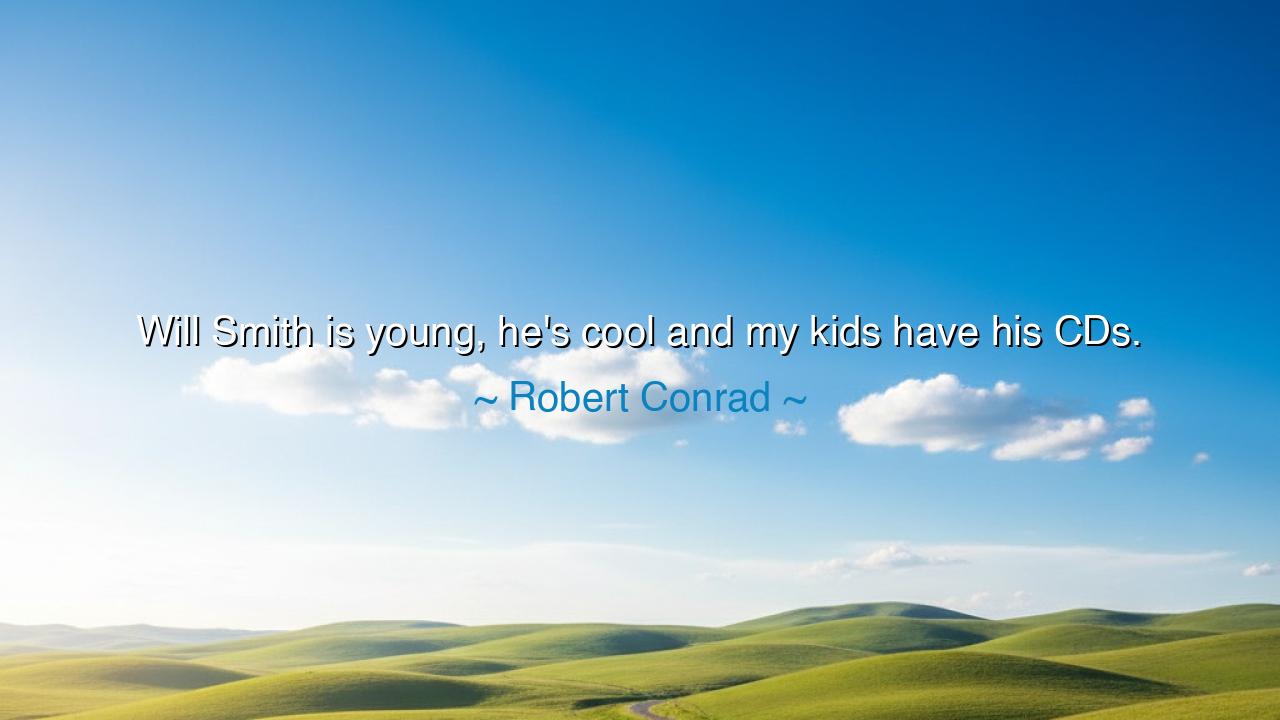
Will Smith is young, he's cool and my kids have his CDs.






In the ebb and flow of life, there are moments when the passing of time brings about the rise of new heroes, new figures who represent the pulse of the present generation. Robert Conrad, in his simple yet profound words, speaks of the cultural shift that often accompanies the changing tides of society. "Will Smith is young, he's cool and my kids have his CDs." These words, spoken with the recognition of the changing world, capture the essence of how cultural icons evolve and how they resonate with each new wave of people. Just as the ancients understood the passing of power, art, and influence, Conrad’s reflection highlights the shift of influence from one generation to the next.
In the days of the ancient Greeks, the great poets and warriors were celebrated not only for their strength and valor, but for the way they captured the spirit of their time. Homer, the blind poet, immortalized the exploits of Achilles and Odysseus, whose actions defined the values of their age. These heroes were not simply warriors, but symbols of the ideal—the strength, courage, and wisdom that each new generation looked up to. Today, Will Smith, much like Achilles or Odysseus, has become a symbol for many young people—a hero in his own right, not with sword or shield, but with his talents and charisma in the entertainment world.
It is not just that Will Smith is admired by the young, but that he, like the heroes of old, represents something far deeper: the ideals of a new generation. Just as the great philosophers of Athens influenced the youth with their ideas, so too does the modern figure—be it an actor, musician, or athlete—influence the values, dreams, and aspirations of the young. Conrad’s words reflect how Smith’s music and films became symbols of the era, providing a soundtrack for the lives of those who grew up with his voice as a constant presence. In the same way that Homer’s stories shaped Greek culture, Smith’s CDs are more than just music; they are an anthem of the time, a marker of a culture that values both entertainment and inspiration.
The impact of such figures is not without its complexity. As history has shown, every generation has its own heroes, whose qualities and actions shape the very character of their time. Elvis Presley, the “King of Rock,” was a figure of immense cultural importance in the 20th century, symbolizing the youthful rebellion and the vibrancy of the post-war era. Like Smith, Presley represented something powerful—an energy and charisma that drew people in, made them feel alive, and gave voice to their youthful spirit. Yet, as with all cultural figures, the rise of one hero often brings with it the inevitable passing of another. Just as Presley once held sway over the hearts of the young, Smith, too, has captured the attention of the next generation. The timeless nature of this cycle teaches us that the role of hero and influence is constantly evolving, driven by the spirit of the age.
Smith’s influence, as expressed through the admiration of Conrad and the praise of his children, is not merely a reflection of celebrity, but a sign of how deeply figures in the arts can shape the soul of a generation. Through his music, his acting, and his larger-than-life personality, Smith has come to represent the dream of success, resilience, and the pursuit of happiness. Much like the great orators and leaders of antiquity, who moved people with their words and actions, Smith, through his work, has captured the imagination of those who follow him. His legacy is thus not just as an entertainer, but as a cultural symbol, one that transcends time and places his work in the annals of history.
As the ancients knew well, the role of the hero is not simply about status, but about the influence one has over others. The hero’s actions, words, and art become the mirror through which a generation defines itself. In this sense, Conrad’s reflection is both celebratory and recognition—acknowledging how Smith has become not just an actor, but a figurehead for an entire culture, one that his children and countless others look up to. The quote carries the weight of both admiration and understanding: that heroes, whether from the stage or the battlefield, embody the spirit of the people they represent.
For us, the lesson here is profound. As we move through our own lives, we must recognize the influence we have over others, particularly the younger generation. Just as Will Smith represents the dreams of one age, we too must strive to be figures of positive influence for those who look up to us. Whether through our actions, words, or work, we shape the world around us. It is not enough to simply admire the heroes of our time; we must ask ourselves how we can become heroes in our own right, and how we can inspire future generations to look to us not just for entertainment, but for wisdom, compassion, and purpose. Let us each consider the legacy we wish to leave and the ways in which we can guide others toward a better tomorrow.






AAdministratorAdministrator
Welcome, honored guests. Please leave a comment, we will respond soon